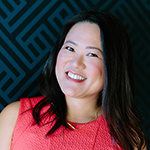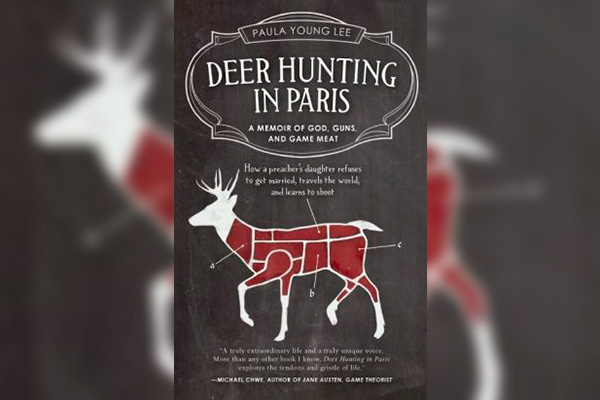What do Asian Americans like to do in their free time? Shop, play tennis, eat… hunt? Fishing, maybe, but I’ve never met an Asian who hunts — that is, until I read Paula Young Lee’s book Deer Hunting in Paris: A Memoir of God, Guns, and Game Meat (Travelers’ Tales Guides). Now, I’m not a big proponent of guns or hunting, but I do respect the idea of knowing where your food comes from and using all parts of the animal, so I was fascinated when Paula Young Lee told me about her book. Lee, who is Korean American and a professor at Tufts University, is in a relationship with a white, Republican, stock broker boyfriend. Oh yeah, and he loves hunting.
Deer Hunting in Paris is a quick, witty read, which bounces between reflections on Lee’s childhood as a Korean American pastor’s daughter and her more recent experiences of hunting near Paris, Maine with her boyfriend and his extended family. However, the book doesn’t really delve into the angle I was most interested in: Lee’s interracial relationship and the chemistry between this big city academic and the extremely conservative Mainers she meets. Luckily, I had a chance to ask Lee some more about this:
HapaMama: What kind of reactions did you receive as an Asian woman when you attended gun/hunting shows?
PYL: Over the course of several years now, I’ve learned that it’s not so much about gender or race as it is about attitude and the willingness to relate to others on their own terms. Except for a few hardline NRA fanatics, who are unfortunately often the loudest voices in the room, most gun guys are thrilled that a woman wants to hear everything they can tell her about their interests. Men. I’ve also met some terrific women as a result of getting involved with hunting. There’s more women out there than you’d think.
HapaMama: You write a lot about how you perceived John’s family, but I’m curious about how they reacted to you. Was there any disapproval or awkwardness because of your race?
PYL: Truthfully, they wouldn’t care what color I was as long as I was Red. Since I’m Purple, I’m only half-okay. Which is true for them in general: I’m a preacher’s daughter (good), but refuse to get married (bad); I am perfectly comfortable with hunting (good) but have food allergies (bad); I can stack firewood (good) but am no good with a chainsaw (bad), etc.
HapaMama: I’ve never met any Asian Americans who hunt, although plenty who love any kind of fishing. Why do you think it’s not popular among Asians?
PYL: There is not much a hunting tradition in East Asia in general. In China, Japan, and Korea, aristocratic hunting more or less died out in the nineteenth century. In these countries today, there is limited access to legal game and restricted access to firearms, making hunting an unlikely option for most people. Without it being supported by a family tradition, hunting is exceptionally difficult to practice. When the average grocery shopper thinks about hunting, she is actually thinking about canned hunts — this being the kind of stuff that gets shown on television — which is a radical shortcut designed to “optimize” the weekend hunter’s experience. In everyday life, hunting takes years and years of immersion in a particular piece of land. It is not a skill set that can be acquired quickly, more like an apprenticeship than an online class. Doesn’t fit well into modern life, and utterly unrewarding for the A-type offspring of Tiger moms.
HapaMama: You seem to be a big fan of organ meats. I love a good liver myself, once in a while and wrote about it here. In my experience, this is a lost appreciation in America, even though the folks in your book seem to be perfectly fine with eating them. Does your Korean background influence that?
PYL: Ah, offal. No one is indifferent to the disjecta membra. Either you love organ meat, or you think it’s cat food. I’ve always adored liver (in French, it’s foie gras, and shaped in little medallions, which makes it gourmet.) I don’t know if being Korean is a factor: my sister loathes it, and my brother will sort of eat it. Pragmatism informs my eating habits, and a certain impatience with princess-y food attitudes is clearly my parents’ influence. However, it’s just as much a function of growing up rural, then traveling the world and sharing meals in places that don’t appear in guide books.
I study all of this from a historical perspective. I have a doctorate in architectural history from the University of Chicago, focusing on the architecture of animal captivity (zoos, slaughterhouses, farms.) I’m about to finish a major historical book about animals at the court of 17th-century Versailles, including its food animals and the role of royal hunting in relationship to politics. So learning to actually hunt, and immersing myself in the culture, was a natural segue for me. I think of learning to hunt as going to grad school in wild meat. It takes more time, focus, patience, and brains than getting a doctorate. You can’t eat prestige, and a dissertation tastes like paper. Whereas a deer is delicious. To some, that attitude makes me a cretin. What it actually makes me is a typical Virgo.

Do you or anyone in your family hunt? Tell me what of hunting — or organ meats, for that matter…


interesting premise.I agree there are more questions deserving answers IMO. I am left wanting more information like, is the writer a first generation PhD, or college grad? What kind of answer is “I am purple.” She doesn’t seem to answer questions directly.
Interesting. Though East Asians do not hunt much (maybe not anymore for past centuries…because um, there’s not much wildlife to kill there. A lot of hunted down. Rest illegal…), many do eat a wide range of meats often.
Alberta has one of Canada’s more vocal gun owners. It must the whole ranchland history, looser western traditions. I was puzzled that a work colleague, an Asian-Canadian said she has a handgun…just to have one. Odd.
But maybe this ties in neatly with her love of playing ice hockey, motorcycling.